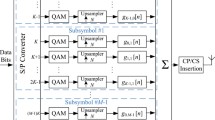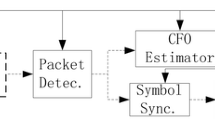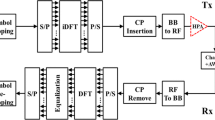Abstract
This article deals with a new energy based adaptive timing synchronization scheme (ATS) which estimates the symbol timing information within two (2) OFDM symbols and updates the information with different frequency bands (adaptive in sense) in a multi-band orthogonal frequency division multiplexing (MB-OFDM) based system. The new approach provides significant improvement in system performance for high delay spread ultra-wideband (UWB) channel model (CM) environments where fast and low-complexity timing synchronization is a critical issue. This paper also addresses a crucial aspect of UWB channel which is frequency dependent delay characteristics. This effect contributes to different dispersion and timing shift of an UWB signal for different frequency bands. In this work, the wideband channel delay characteristics are studied and delay parameters are found considerably different over frequency bands 3.1–4.6 GHz. Based on this observation, the ATS which estimates and maintains the timing delays of each band separately is presented. The performance of ATS algorithm is measured by mean-squared error (MSE), synchronization probability, signal to interference ratio (SIR) reduction due to synchronization errors and bit error rate (BER) through the computer simulation for several UWB CM environments CM2–CM4. Each of these UWB CMs is simulated for 100,000 noisy channel realizations for both coded and uncoded MB-OFDM system. It is shown that ATS gives signal-to-noise ratio (SNR) improvement of 1.1 dB at BER of 1 × 10−3, 1.2 dB at BER of 2 × 10−4, and 0.7 dB at BER of 2 × 10−4 for CM4, CM3, and CM2 respectively for coded MB-OFDM system over a non-adaptive synchronization scheme [Yak et al., Proceedings of IEEE PIMRC, Berlin, Germany, vol 1, pp 471–475, September 11–14, 2005].
Similar content being viewed by others
References
ECMA-368. (2008). High rate ultra wideband PHY and MAC standard (3rd ed.). Accessed December 2008, from http://www.ecma-international.org/publications/standards/Ecma-368.htm.
Qiu R.C. (2002) A study of the ultra-wideband wireless propagation channel and optimum UWB receiver design. IEEE Journal on Selected Areas in Communications 20(9): 1628–1637
Geng, S., & Vainikainen, P. (2006). Frequency and bandwidth dependency of UWB propagation channels. In Proceedings of IEEE PIMRC, Helsinki, Finland (pp. 1–5), September 11–14, 2006.
Sen, D., Chakrabarti, S., & Raja Kumar, R. V. (2008). An efficient frequency offset estimation scheme for multi-band OFDM ultra-wideband systems. In Proceedings of IEEE VTC 2008–spring, Singapore (pp. 973–977), May 11–14, 2008.
Yak, C. W., Lei, Z., Chattong, S., & Tjhung, T. T. (2005). Timing synchronization and frequency offset estimation for ultra-wideband (UWB) multi-band OFDM systems. In Proceedings of IEEE PIMRC, Berlin, Germany (Vol. 1, pp. 471–475), September 11–14, 2005.
Yoon S.-H., Chong J.W. (2006) Packet detection and symbol timing synchronization algorithm for multi-band OFDM UWB. IEICE Transactions on Communications 89-B(4): 1433–1435
Wessman, M.-O., Svensson, A., & Agrell, E. (2004). Frequency diversity performance of coded multiband-OFDM systems on IEEE UWB channels. In Proceedings of IEEE VTC Fall, Los Angeles, CA, USA (Vol. 2, pp. 1197–1201), September 26–29, 2004.
Introduction to Physical Layer Specifications of MB-OFDM UWB Proposal. (2004). Accessed September 22, 2004, from http://wise.cm.nctu.edu.tw/wise_lab/course/Seminar/Download%20files/MB_OFDM_UWB.pdf.
Foerster, J. (Ed.). (2003). Channel modeling sub-committee report final. IEEE, Document IEEE P802.15-02/490r1-SG3a.
Molisch A.F. (2005) Ultrawideband propagation channels—theory, measurement, and modeling. IEEE Transactions on Vehicular Technology 54(5): 1528–1545
Li, Y., Jacobs, T., & Minn, H. (2006). Frequency offset estimation for MB-OFDM-based UWB systems. In Proceedings of IEEE ICC, Istanbul, Turkey (Vol. 10, pp. 4729–4734), June 11–15, 2006.
Van De Beek J.J., Sandell M., Borjesson P.O. (1997) ML estimation of time and frequency offset in OFDM systems. IEEE Transactions on Signal Processing 45(7): 1800–1805
Schmidl T.M., Cox D.C. (1997) Robust frequency and timing synchronization for OFDM. IEEE Transactions on Communications 45(12): 1613–1621
Sen, D., Chakrabarti, S., & Raja Kumar, R. V. (2008). Symbol timing synchronization for ultra-wideband (UWB) multi-band OFDM (MB-OFDM) systems. In Proceedings of IEEE COMSWARE, Bangalore, India (pp. 200–203), January 5–10, 2008.
Author information
Authors and Affiliations
Corresponding author
Rights and permissions
About this article
Cite this article
Sen, D., Chakrabarti, S. & Raja Kumar, R.V. An Adaptive Timing Synchronization Scheme for Multi-Band Orthogonal Frequency Division Multiplexing Based Ultra-Wideband Communication Systems. Wireless Pers Commun 53, 281–298 (2010). https://doi.org/10.1007/s11277-009-9684-5
Received:
Accepted:
Published:
Issue Date:
DOI: https://doi.org/10.1007/s11277-009-9684-5




